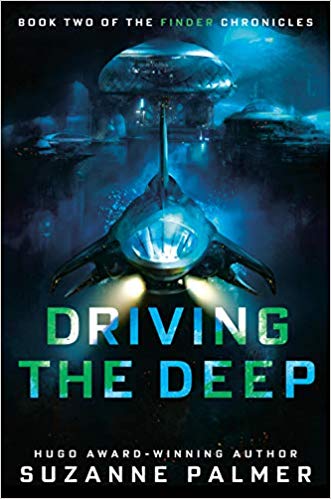 Driving the Deep (Finder Chronicles, #2) by Suzanne Palmer
Driving the Deep (Finder Chronicles, #2) by Suzanne Palmer Format: audiobook, eARC
Source: purchased from Audible, supplied by publisher via NetGalley
Formats available: hardcover, ebook, audiobook
Genres: science fiction, space opera
Series: Finder Chronicles #2
Pages: 432
Published by DAW Books on May 5, 2020
Purchasing Info: Author's Website, Publisher's Website, Amazon, Barnes & Noble, Kobo, Bookshop.org
Goodreads
From a Hugo Award-winning author comes the second book in this action-packed sci-fi caper, starring Fergus Ferguson, interstellar repo man and professional finder.
As a professional finder, Fergus Ferguson is hired to locate missing objects and steal them back. But it is rarely so simple, especially after his latest job in Cernee. He's been recovering from that experience in the company of friends, the Shipmakers of Pluto, experts at crafting top-of-the-line AI spaceships.
The Shipmakers have convinced Fergus to finally deal with unfinished business he's been avoiding for half his life: Earth. Fergus hasn't been back to his homeworld since he was fifteen, when he stole his cousin's motorcycle and ran away. It was his first theft, and nothing he's stolen since has been anywhere near so easy, or weighed so heavily on his conscience. Many years and many jobs later, Fergus reluctantly agrees that now is the time to return the motorcycle and face his family.
Unfortunately, someone has gotten to the motorcycle before him. And before he can figure out where it went and why the storage unit that held it is now filled with priceless, stolen art, the Shipyard is attacked. His friends are missing, presumably kidnapped.
Accompanied by an untrustworthy detective who suspects Fergus is the art thief and the sole friend who escaped the attack, Fergus must follow the tenuous clues to locate and save his friends. The trail leads them to Enceladus, where Fergus plans to go undercover to the research stations that lie beneath the moon's thick ice sheet deep in a dark, oppressive ocean.
But all movement and personnel are watched, and the limited ways through the thick ice of the moon's surface are dangerous and highly monitored. Even if Fergus can manage to find proof that his friends are there and alive, getting out again is going to be a lot more complicated than he bargained for.
My Review:
Fergus Ferguson has a gift, and not just the one that he thinks he has, his ability to put the pieces together to find things – and people – that are missing. Fergus’ more important gift is the gift of making friends wherever he goes – no matter how dangerous the situation or unlikely the friendship might be. Or how incredibly difficult the mess he makes may be to get out of.
Because Fergus Ferguson is every bit as good at making his life into a mess as he is at finding his way out of the mess he’s just made.
But this particular mess is going to be a bigger challenge than average – even for him. His friends from the Shipyards at Pluto are all missing, presumed dead. Or possibly missing, presumed kidnapped. Except for the one who isn’t dead, but is suspected of having caused the kidnapping and/or death of the others. Except she didn’t, but someone is trying awfully hard to make it look that way, in order to make everyone look the other way from whatever really happened.
Meanwhile, Fergus is stuck, deep under the ice on Enceladus, Saturn’s ice-covered moon. After all, it’s easy to hide things in a cold and dark place that damn few people want to go to in the first place. Especially dirty deeds being done, not exactly dirt cheap. Possibly on the public’s dime – or whatever passes for currency by Fergus’ time.
All Fergus has to do is figure out if his friends are down there, where they’re being held if they are, why they were kidnapped in the first place – and, of course, rescue them. Without getting them all killed.
And especially without drawing the notice of “the Bastards Above”.
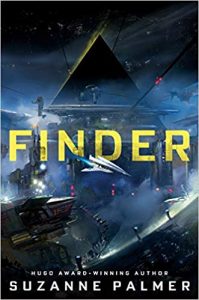 Escape Rating A-: I picked this up because I loved the first book in the Finder Chronicles. That book is named basically for Fergus, and it’s just called Finder. And it’s awesome.
Escape Rating A-: I picked this up because I loved the first book in the Finder Chronicles. That book is named basically for Fergus, and it’s just called Finder. And it’s awesome.
Both books, in fact, are an absolute treat to listen to, as the entire story so far is told from Fergus’ first person perspective, and the narrator does an excellent job of capturing Fergus’ wry, self-deprecating and universe-weary tone.
Howsomever, as often happens, I listened to the first half of this one and read the second, because I just couldn’t wait to find out how Fergus got himself out of the mess this time. Because it’s a doozy.
This feels like a story about closure, and perversely about opening. There’s that saying that when one door closes, another one opens. For Fergus, it feels a bit like he has to close that first door before he can let himself open the second one. Fergus ran away from home on Earth in his late teens, just after his dad committed suicide by drowning. An act that certainly comes back to haunt Fergus in the deeps under the ice of Enceladus.
But this story begins with Fergus going back to Earth for the first time in two decades, because there’s that door behind him that he needs to close. When he left he stole his cousin’s motorcycle. And it’s time for him to go back and take care of that debt, because looking back is keeping him from moving forward.
No plan of Fergus’ ever seems to survive contact with, well, Fergus, so his plan to get the motorcycle out of the storage locker he’s been paying for all these years turns up, not the motorcycle, but a whole bunch of stolen paintings that seem to be the ill-gotten gains from a museum robbery not unlike the real-life Isabella Stewart Gardner Museum theft in Boston in 1990.
Uncovering the paintings uncovers an undercover cop looking for the thieves. An obsessed man who is convinced that Fergus was one of the thieves he’s been hunting for years. Of course, his plans don’t survive Fergus either, and eventually, after a lot of misunderstandings and a few bouts of fisticuffs, they both end up trying to free Fergus’ friends.
But all of that turns out to be setup, as fascinating as it generally was. The story is really Fergus’ story, all alone in the dark of Enceladus, desperately hanging on to hope and trying to come up with a plan, in the face of the endless night and the unrelenting dark under the water.
In the end, with the help of new friends and old, including the stray cat Mister Feefs, Fergus manages to find the heart of this mystery. After all, while Fergus’ own plans never survive contact with Fergus – neither do anybody else’s.

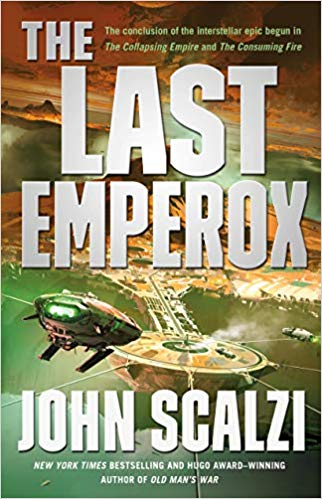 The Last Emperox (The Interdependency, #3) by
The Last Emperox (The Interdependency, #3) by  Making it all the more amazing that when this story began, with the writing of the first book in the series,
Making it all the more amazing that when this story began, with the writing of the first book in the series, 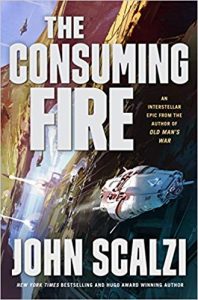 Escape Rating A+: I had a terrible approach/avoidance issue with this book. A part of that was because I had originally intended to listen to it, as I have to the entire rest of the series. The walking profanity explosion that is Kiva Lagos is best appreciated in audio. She just doesn’t have the same impact when reading the book yourself. Also, Wil Wheaton has done a fantastic job with the series, including this entry. But I normally listen while driving, or while on a treadmill at the gym, and everything has been closed. I had more time for reading but fewer opportunities for listening. In the end I mostly played Solitaire and just let the audio wash over me. It was marvelous.
Escape Rating A+: I had a terrible approach/avoidance issue with this book. A part of that was because I had originally intended to listen to it, as I have to the entire rest of the series. The walking profanity explosion that is Kiva Lagos is best appreciated in audio. She just doesn’t have the same impact when reading the book yourself. Also, Wil Wheaton has done a fantastic job with the series, including this entry. But I normally listen while driving, or while on a treadmill at the gym, and everything has been closed. I had more time for reading but fewer opportunities for listening. In the end I mostly played Solitaire and just let the audio wash over me. It was marvelous.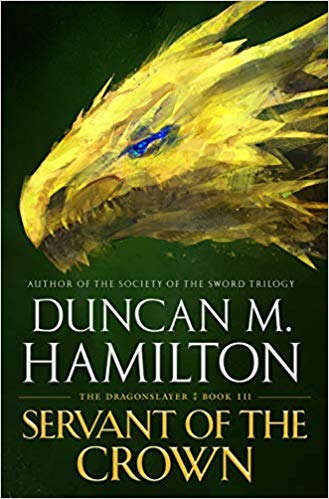 Servant of the Crown by
Servant of the Crown by 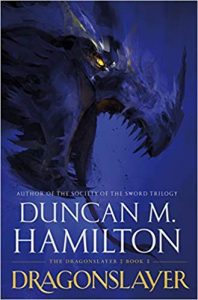 First things first. I just want to say what a treat it was to start a series, fall in love with it, and be able to just read – or be read to – all the way through to the end without having to wait months if not years for the later books in a series. I don’t always have that opportunity, either because I fall in love with the first book long before the others are out, or because I run into the “so many books, so little time” conundrum and have to space things out because of other reading commitments. Because I waited to start the first book (
First things first. I just want to say what a treat it was to start a series, fall in love with it, and be able to just read – or be read to – all the way through to the end without having to wait months if not years for the later books in a series. I don’t always have that opportunity, either because I fall in love with the first book long before the others are out, or because I run into the “so many books, so little time” conundrum and have to space things out because of other reading commitments. Because I waited to start the first book (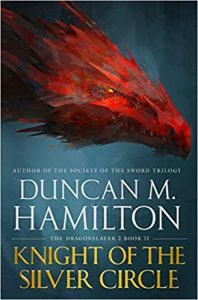 Soléne is that young hero. Gill’s the one out in front to collect all the glory and fight all the battles, or so it seems. But she’s every bit the hero that he is, just from behind the scenes. Her power is huge, but it is also quiet. She’s the mage who operates in the shadows, not because she’s the woman inspiring the hero, but because the power she wields works best from the dark – and the quiet. He knows that she brought him the victory, and he knows that the best thing he can do for her is to acknowledge that privately and not publicly. Not that the Crown won’t give her its own semi-public acknowledgements. Maybe. If they succeed.
Soléne is that young hero. Gill’s the one out in front to collect all the glory and fight all the battles, or so it seems. But she’s every bit the hero that he is, just from behind the scenes. Her power is huge, but it is also quiet. She’s the mage who operates in the shadows, not because she’s the woman inspiring the hero, but because the power she wields works best from the dark – and the quiet. He knows that she brought him the victory, and he knows that the best thing he can do for her is to acknowledge that privately and not publicly. Not that the Crown won’t give her its own semi-public acknowledgements. Maybe. If they succeed.
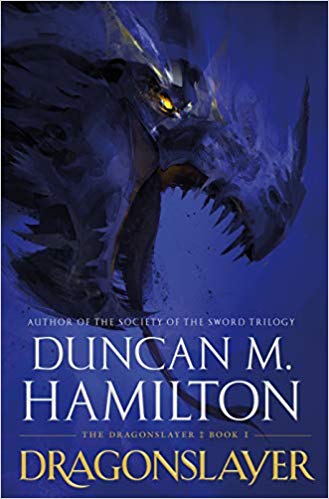 Dragonslayer by
Dragonslayer by 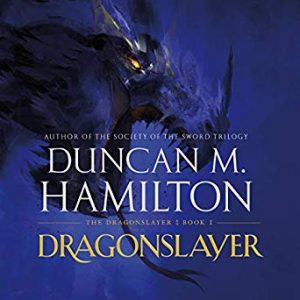 So when I bailed on an audio I just couldn’t tolerate, I remembered I had
So when I bailed on an audio I just couldn’t tolerate, I remembered I had 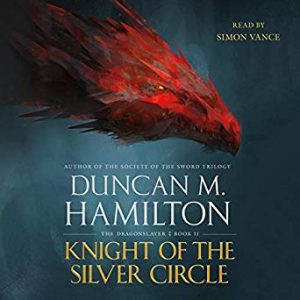 Last but not least, while this book was published in mid-2019 and probably finished sometime the previous year, finishing it today showed some striking parallels between the way that towns and villages were emptying out in hopes of getting away from the dragon and the response to the current COVID-19 pandemic in real life. In both cases, public spaces are empty and people are fearful. A virus is even harder to outrun than a flying, fire-breathing dragon.
Last but not least, while this book was published in mid-2019 and probably finished sometime the previous year, finishing it today showed some striking parallels between the way that towns and villages were emptying out in hopes of getting away from the dragon and the response to the current COVID-19 pandemic in real life. In both cases, public spaces are empty and people are fearful. A virus is even harder to outrun than a flying, fire-breathing dragon.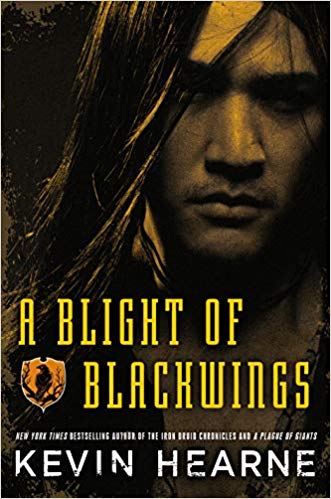 A Blight of Blackwings (Seven Kennings, #2) by
A Blight of Blackwings (Seven Kennings, #2) by 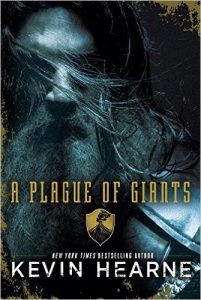 Just as in the first book in the series, the extremely awesome and utterly marvelous
Just as in the first book in the series, the extremely awesome and utterly marvelous 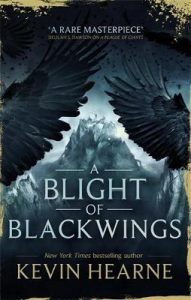
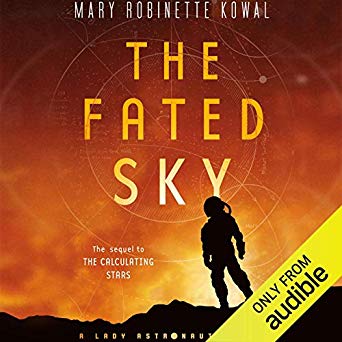 The Fated Sky by
The Fated Sky by  I am also in tears, just as I was at the end of
I am also in tears, just as I was at the end of 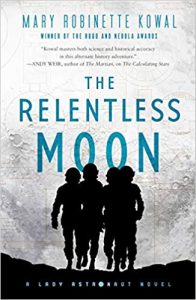 Just as with The Calculating Stars, I’m trying to keep from squeeing and I’m failing. Happily and miserably.
Just as with The Calculating Stars, I’m trying to keep from squeeing and I’m failing. Happily and miserably. Junkyard Cats by
Junkyard Cats by 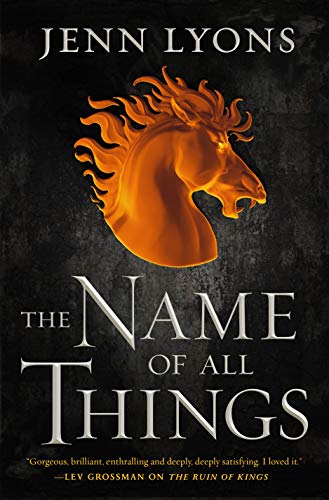 The Name of All Things (A Chorus of Dragons, #2) by
The Name of All Things (A Chorus of Dragons, #2) by 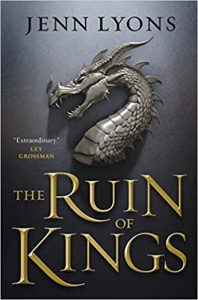 This series began early in 2019 with
This series began early in 2019 with 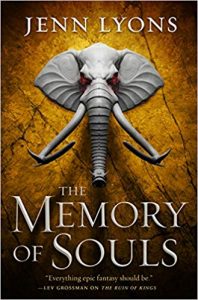 One of the other things that makes this series so mesmerizing is that it is never a simple contest of good vs. evil. Everything in this world is in shades of gray. The gods are not really gods. However, the demons, for the most part, at least so far, seem to really be demonic. But the characters who commit evil acts, like Relos Var and Senera, may have the best of motives. And may still be evil at the same time. Nothing is clear but everything is compelling.
One of the other things that makes this series so mesmerizing is that it is never a simple contest of good vs. evil. Everything in this world is in shades of gray. The gods are not really gods. However, the demons, for the most part, at least so far, seem to really be demonic. But the characters who commit evil acts, like Relos Var and Senera, may have the best of motives. And may still be evil at the same time. Nothing is clear but everything is compelling. The A.I. Who Loved Me by
The A.I. Who Loved Me by 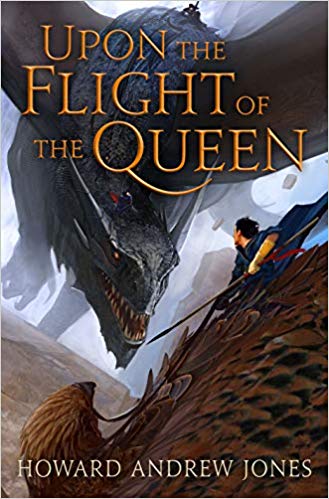 Upon the Flight of the Queen (The Ring-Sworn Trilogy, #2) by
Upon the Flight of the Queen (The Ring-Sworn Trilogy, #2) by 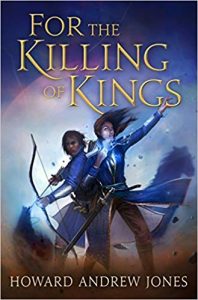 Escape Rating A: While I had a whole dragonload of mixed feelings about the first book in this series, I have absolutely none about this second entry. I loved Upon the Flight of the Queen, in spite of some issues with the audio narration that I’ll get to in a minute.
Escape Rating A: While I had a whole dragonload of mixed feelings about the first book in this series, I have absolutely none about this second entry. I loved Upon the Flight of the Queen, in spite of some issues with the audio narration that I’ll get to in a minute.